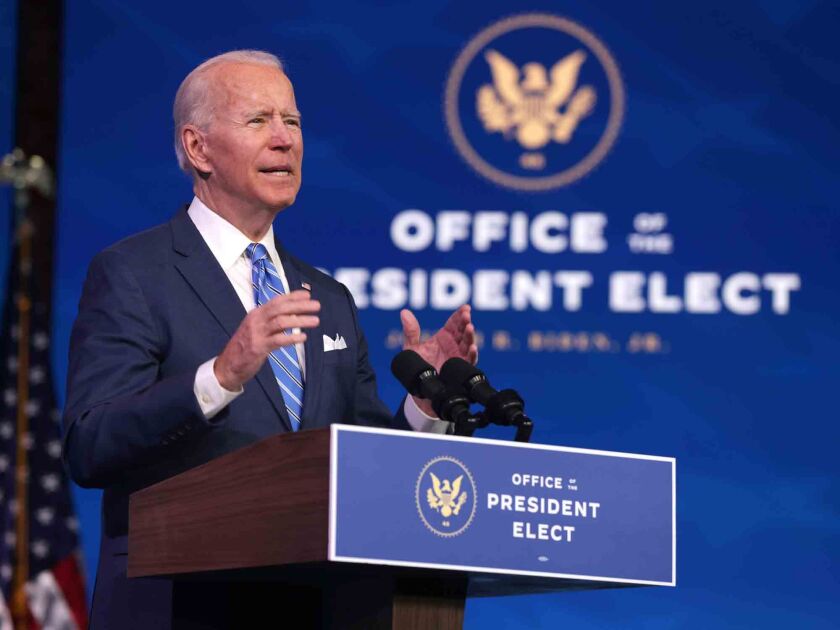President-elect Joe Biden’s $1.9 trillion economic relief proposal serves as the opening salvo in a legislative battle that could be prolonged by the go-big price tag and the inclusion of initiatives opposed by many Republicans.
Biden’s hand was bolstered by Friday’s release of U.S. retail sales data for December, which showed a third straight monthly decline as the pandemic sapped activity. The results indicated that the biggest part of the U.S. economy — consumer spending — took a step back last quarter.
David Wilson is group head of risk intelligence at the London Stock Exchange Group.
Mr. Wilson joined the firm in 1999 and is a managing director responsible for the Liability Driven Investment business segment. His background includes structuring and managing complex asset/liability programs, utilizing multiple strategies in different currencies. During his career, he has developed innovative solutions for clients seeking to optimize their business profile, generate value, de-risk or manage liquidity. He possesses strong capabilities in treasury management, structuring and capital modeling, risk management and hedging. Mr. Wilson has a bachelor's degree in economics from the University of Albany and a master's degree in finance from Fordham University. He holds the designation of Chartered Financial Analyst (CFA) through the CFA Institute and is a member of the New York Society of Security Analysts.
Gary Hallgren is president at Arity, where he leads the development and implementation of Arity's strategy and operations.
Gary has extensive experience creating next-generation telematics solutions and Software as a Service (SaaS) business models, managing mergers and acquisitions of public and venture-backed companies and leveraging data and analytics to create breakthrough business opportunities.
Prior to joining Allstate in 2015, Gary served as senior vice president of Corporate Strategy at Telogis, where he negotiated four strategic acquisitions related to fleet management, insurance telematics, routing and logistics and commercial navigation. Previously, he was CEO of Remote Dynamics Inc., where he led a turnaround and positioned the company as a leading telematics supplier to the construction industry.
Earlier in his career, Gary served as president and CEO of WirelessCar North America, Inc., which provides telematics services to the fleet management industry and vehicle manufacturers. He also served as vice president of operations at Volvo Technology of America, which provides telematics solutions for cars, trucks and marine products.
“It’s not hard to see that we’re in a once-in-several-generations economic crisis,” Biden said Thursday night in unveiling his plan. “We have to act and we have to act now.”

The package has elements that would likely appeal to enough moderate Republicans to gain favor in the Senate — including a $400 billion effort to contain the coronavirus and speed the economy’s reopening, as well as $1,400 in additional direct stimulus payments.
Other parts are set to spur partisan warfare, including Biden’s proposals to more than double the federal minimum wage to $15 an hour, provide large-scale aid for state governments and offer higher unemployment benefits through September.
Negotiations could end up producing a smaller bipartisan package in the coming weeks, followed by a larger budget bill later in the year with Democratic priorities. Biden said he plans to unveil a second major package, aimed at longer-term economic rebuilding, at a joint session of Congress next month.
Republican Senator Marco Rubio of Florida kicked off calls for breaking the relief plan into pieces, tweeting that since Biden served in the Senate for more than 35 years “he knows the plan he outlined tonight can’t pass ‘quickly.’” Rubio called for proceeding with the $1,400 stimulus checks first.
While it’s possible Democrats might find ways to get the bulk of the package through the Senate with just majority support, “it looks more likely that the need to find bipartisan support might constrain the size of the package,” Goldman Sachs Group Inc. analyst Alec Phillips wrote in a note to clients. Still, Goldman boosted its forecast for near-term fiscal stimulus to $1.1 trillion from the $750 billion it had predicted before Biden’s roll-out.
Biden has several advantages in the struggle, including an ability to bypass Senate Republicans on some of the items using a special tool called budget reconciliation.
Enjoying unified Democratic control of Congress, Biden will also have the White House bully pulpit to put pressure on Congress to act. He has offered his plan as a way for the nation to come together to provide relief to impoverished Americans after the unprecedented mob violence in the Capitol last week, and amid the record spike in deaths from the pandemic.
“Unity is not a pie-in-the-sky dream, it is a practical step to getting things done,” Biden said Thursday. “The very health of our nation is at stake.”
The looming trial of outgoing President Donald Trump is set to prolong the partisan tensions of recent weeks. Unless incoming Senate Majority Leader Chuck Schumer and Republican leader Mitch McConnell strike agreement on procedures, it could prevent a floor vote on Biden’s cabinet nominations and legislation for weeks, though it wouldn’t delay committee work.
If Biden can’t get a deal on the whole bill, provisions such as stimulus checks and a $400-per-week boost to unemployment insurance could be put into a budget bill and passed with just 50 votes. There is a debate about whether the minimum wage could also be raised that way.
The incoming president is a veteran of dealing with McConnell, who may be willing to horse-trade for his priorities like COVID-19 liability protections for employers or an extension of business tax breaks.
Many economists are anticipating a robust period of growth in the U.S. once vaccinations get the virus under control and normal commerce resumes, but a rough road remains. The drop in retail sales last month came alongside the first decline in monthly payrolls since April. Unemployment remained mired at 6.7 percent.
Things could worsen in the coming months. Some extra support measures for small businesses and the unemployed passed by Congress in December run out in March, and a federal eviction moratorium expires at the end of January.
“Given the urgency of the current crisis and the desire to achieve passage in the administration’s first 100 days, we expect a narrower package to ultimately emerge — in the vicinity of $1 trillion,” said Andrew Husby, an economist with Bloomberg Economics. “That figure could be enough to push economic growth above 5 percent this year, compared with our current baseline of 3.5 percent.”
The U.S. Chamber of Commerce said in a statement Thursday it “welcomes the introduction of President-elect Biden’s American Rescue Plan,” and singled out praise for the vaccination focus, while omitting comment on the minimum-wage increase.
Kevin Brady, the top Republican on the House Ways and Means Committee, said the package was bad for businesses. “Special interests and liberals are cheering. The jobless and Main Street are left shaking their heads.”
But leading Democrats praised the plan.
Schumer and House Speaker Nancy Pelosi pledged in a statement to work quickly to put “Biden’s vision into legislation that will pass both chambers and be signed into law.”
Congressional Democrats will have their own requests. Incoming Senate Finance Committee Chairman Ron Wyden indicated he wants the plan tweaked to tie unemployment benefits to unemployment rates. “I look forward to taking the lead on a proposal that puts a stop to needlessly lurching from crisis to crisis, and gives jobless workers the certainty that they will be able to buy groceries and make rent,” he said in a statement.
Major lift
The bill would dedicate $350 billion for state and local governments, well beyond the $160 billion for such funding included in a bipartisan compromise that never made it into the December package.
Biden is also seeking to boost refundable tax credits for those with low-income and children while substantially expanding paid family and medical leave.
All of this will be a major lift for Congress to complete by the mid-March expiration of expanded unemployment benefits for gig workers and the long-term jobless, which has created a benefits cliff.
The new administration is under pressure not to allow a repeat of the eight-month standoff that held up the last round of economic relief.
One advantage: the departure of a volatile Trump, who changed his positions frequently in the talks and ultimately sat on the sidelines after losing the November election — only to threaten a veto of the passed bill at the last minute.
--With assistance from Mario Parker and Christopher Condon



